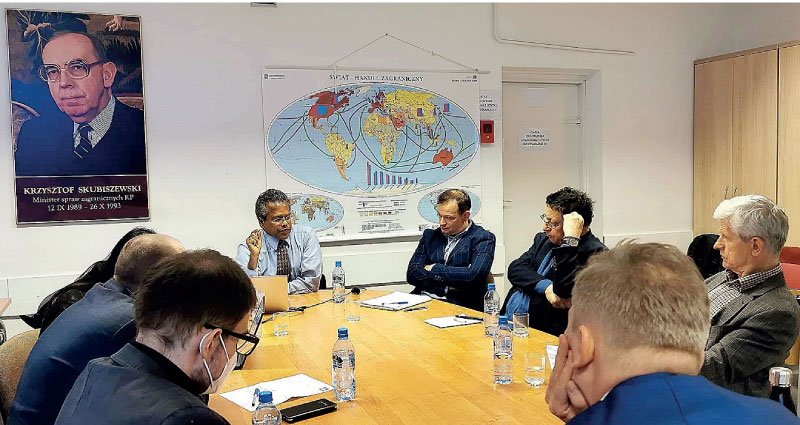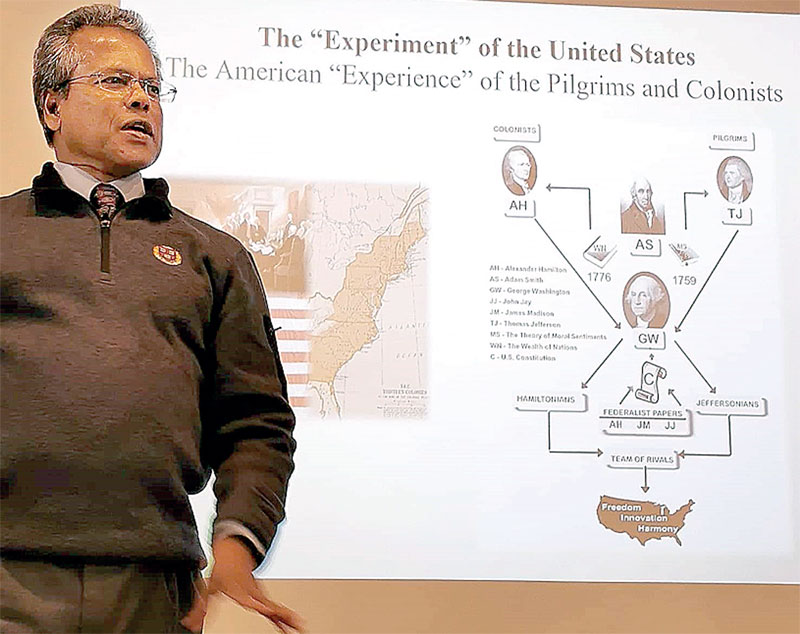Friday Feb 27, 2026
Friday Feb 27, 2026
Thursday, 2 December 2021 01:19 - - {{hitsCtrl.values.hits}}

Prof. Patrick Mendis in discussion with policy experts and university professors at the Warsaw University
By Jakub Knopp and Nikita Bogdanovich
Warsaw, Poland: Sri Lankan-born and Harvard and Minnesota educated Prof. Patrick Mendis described the island-nations of Taiwan and Sri Lanka as the two “unsinkable aircraft carriers” in the evolving rivalry between China and the United States. He made these remarks during a series of lectures at the University of Warsaw in Poland.
In his lecture on ‘The American Vision, the Chinese Mission: Will there be a War over Taiwan?’ at the Faculty of Political Science and International Studies, the former US diplomat presented a historical analysis of Sino-American relations. He focused on Taiwan, Sri Lanka and other strategic and global issues.
Prof. Mendis first introduced the evolving geostrategic situation and the changing nature of bilateral relationships between China and the United States. Looking back in world history, he stressed how international relations between and among countries experienced the various stages of change and engagement. He then emphasised the periods of both “hostility and cooperation” while giving examples from the American Revolutionary War (against the British) and the recently signed AUKUS defence pact with the United Kingdom, the United States and Australia.
Strategic competition
With the ongoing economic growth and comprehensive power of China, both Beijing and Washington have increasingly involved in various kinds of political, economic, military, and even technological conflicts, Prof. Mendis explained. Today, the United States and China are competing over the control and implementation of new technologies around the globe—such as the 5G technology, artificial intelligence, space exploration, and cyber security.
The increase in China’s military power and influence in the Indo-Pacific region and other countries is of great concern to the United States. American leaders are now primarily alarmed by China’s strategic position in East and Southeast Asia as well as South Asia, where Beijing has undermined Washington’s traditional position in economic, political, diplomatic, and military capabilities. This is more prominent in the South China Sea, where Beijing has built artificial islands projecting military and naval power.
To understand how the United States and China became most powerful countries in the world, one should delve deeper into history. Prof. Mendis said that since its creation, the United States evolved into two political and foreign policy traditions. With the “experience” of the Pilgrims and the Colonists, the Founding Fathers began to have a new American “Experiment” in the new nation.
Colonists vs. Pilgrims
With the Colonists, who landed in Virginia, the nascent nation pursued a strategy of centralized economic development while exploiting natural resources for greater wealth and capital formation through a federal banking system. The colonial experience influenced Alexander Hamilton to formulate a manufacturing and industrial policy as the first Secretary of the Treasury in the President George Washington’s administration.
The Pilgrims, who arrived on the American shore near Boston in Massachusetts, were focused more on religious freedom and grassroots democracy that were later championed by Thomas Jefferson, the first Secretary of State in Washington’s cabinet. Naturally, these motivations caused subtle but “creative” conflicts throughout the “American Experience.” These conflicting motivations between wealth creation and religious sentiment led to the development of new American polity and innovative enterprise that is even seen in today’s political environment, Prof. Mendis further explained.
Throughout the American Experiment, the United States has been pursuing what is now dubbed as the “Empire of Liberty,” which was coined by Thomas Jefferson, who became the third US president. Influenced by the legacy of the Pilgrims, Jefferson promoted the ideas of democracy and religious freedom that are still being advocated by the US Department of State, the diplomat added.
China trade
Pursuing the other traditions of the Colonists, the young United States officially initiated and promoted its trade with China for economic development. Admiring the Chinese culture and economic prosperity of the Middle Kingdom, the new nation dispatched its merchant ship, “the Empress of China,” from New York Harbour in 1784 on President George Washington’s birthday to Canton (now Guangzhou near Hong Kong). It highlighted importance of China to the new republic.
These historical traditions were revived in the recent past, especially after Deng Xiaoping introduced the open economic and reform policies after the death of Chairman Mao Zedong. Hoping that Beijing would essentially follow the path of the American Experiment, US President Bill Clinton and other Congressional leaders supported China for its integration into global marketplace. Thus, the Clinton administration was a staunch proponent of China’s entry into the World Trade Organization.
The American and other world leaders have now begun to realise that China has other intentions as Beijing leaders have taken a more assertive and confrontational path—disregarding religious freedom and human rights that the United States expected from China to honour as a global stakeholder.
Moreover, Prof. Mendis noted that once the economic reforms were carried out, the Chinese people were no longer as poor as they used to be; thus, a new form of nationalism emerged with authoritarian and communist characteristics since President Xi Jinping introduced the Belt and Road Initiative (BRI). Consequently, when the population finally got the opportunity to prosper—and development began to gain a global traction through BRI, the desire for political freedoms and democratic values are no longer struck a chord with Chinese leaders.
China’s manifest destiny
In his lecture, Prof. Mendis made an apt parallel between the historical American drive westward and ‘manifest destiny’ with that of the ancient Silk Road and the Chinese attempts at gaining influence in the Eurasian landmass, as seen in the ongoing expansion of BRI projects and activities in Central Asia and Eastern Europe.
The latter example of Chinese desire to venture westward in Eurasia was presented by the evolution of the centuries-old terrestrial Silk Road since the Han Dynasty to the height of cosmopolitan China in the Tang Dynasty. The famous 15th century voyages of Admiral Zheng He in the Ming Dynasty is the other component of the Maritime Silk Road in BRI that goes through Sri Lanka, Prof. Mendis elaborated.
Expanding this historical backdrop, he underscored the importance of BRI and psychological warfare waged by the Chinese ‘Wolf Warrior’ diplomats. In the views of increasing Chinese domination in space and cyber domains could prove vital in a struggle whose ultimate goal is to control the minds of the people in China and BRI-associated countries. In effect, the Communist Party of China would eventually realise the ‘China Dream’ to revive the ‘Celestial Empire,’ Prof. Mendis predicted.
The difference between the ‘China Dream’ and the ‘American Dream’ lies in the idea that the former is formulated as a national dream with nationalism in mind, as opposed to an individual dream with ‘life, liberty, and the pursuit of happiness’ in the United States. Thomas Jefferson is credited with the American phrase in the US Declaration of Independence.
Taiwan, Sri Lanka, and AUKUS
Moreover, Prof. Mendis also touched on the issues of geopolitics and geo-economics by focusing on Taiwan and Sri Lanka, which he dubbed these island-nations as the two “unsinkable aircraft carriers” that would provide either China or the US with indispensable bridgeheads to mount additional attacks or to defend their spheres of influence and key supply routes. He applied the idea of “unsinkable aircraft carrier” to Sri Lanka that was originally referred to Taiwan (then Formosa) by General Douglas MacArthur of the United States.
Furthermore, the Professor stated that the Taiwanese millennials who were born in a free and democratic society are lacking the ‘Cold War’ mindset prevalent in the circles of their ancestors. Importantly, he added that the recently signed AUKUS defence pact of Australia, the UK, and the US identified itself as a “China deterrent,” but not so much as a stage for another Cold War mentality.
However, the military pact would serve as a catalyst for establishing a block of like-minded democratic countries in the Indo-Pacific as well as a force multiplier. The US-led defence agreement would also allow a greater degree of military interoperability beyond the trilateral partnership to include the French, German, and Japanese naval and air forces operating in the Indo-Pacific waters.
History matters
Overall, the lecture was insightful and innovative on the hidden motivations of China and the founding vision of the United States, as Prof. Mendis underscored the importance of looking into the past when trying to get a sense of what might lie ahead.
A sobering claim by Prof. Mendis was that “all roads lead to Taiwan in the Pacific Ocean” and “Sri Lanka in the Indian Ocean” encapsulated the Chinese historical sentiment emanating from ‘The Century of Humiliation’ and injustice felt by the Chinese people since the first World War.

Prof. Patrick Mendis presenting on US-China relations and the European Union for policy experts and university professors at the Warsaw University
(The two authors who compiled this report are post-graduate students in the Faculty of Political Science and International Studies at the University of Warsaw in Poland.)